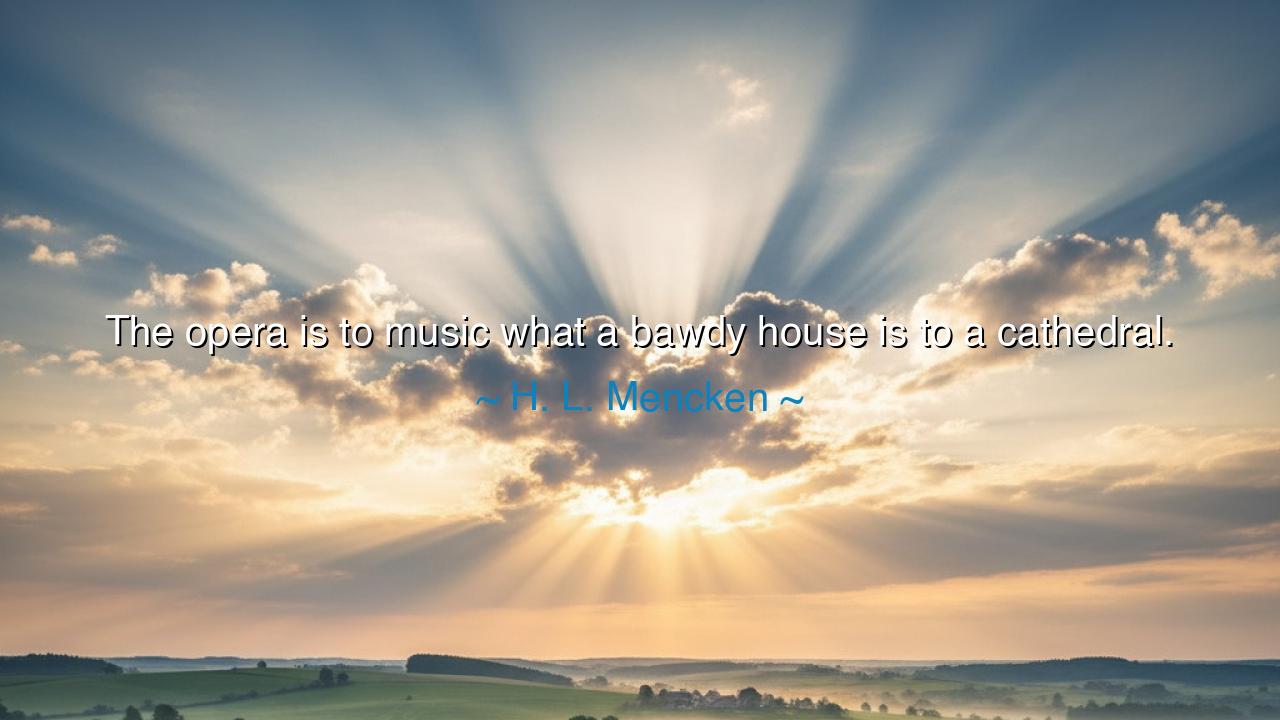
The opera is to music what a bawdy house is to a cathedral.






"The opera is to music what a bawdy house is to a cathedral." Thus thundered H. L. Mencken, wielder of wit sharper than a sword, unafraid to pierce the pomp of society. His words, though humorous and cutting, conceal a deep meditation on the nature of art, purity, and spectacle. For in this contrast, he teaches that there are sacred forms and there are corrupted forms—each bearing the name of the same thing, yet embodying opposite spirits. The cathedral is reverence, silence, devotion; the bawdy house is noise, indulgence, and excess. So too, he claims, does true music stand apart from the overblown drama of opera.
The origin of Mencken’s saying lies in his lifelong suspicion of pretense. He was a critic who despised ornament without substance, grandeur without meaning. In the world of opera, with its elaborate staging, melodramatic stories, and indulgent length, he saw something akin to fleshly indulgence. To him, music in its purest form was simple, clear, and transcendent—like the voice of a hymn echoing in a cathedral, pointing upward toward the eternal. The opera, by contrast, was theatrical excess, as gaudy as painted curtains and as noisy as drunken laughter.
History provides examples of this tension. When Johann Sebastian Bach wrote his sacred works, he poured into them a devotion that seemed carved from stone, his compositions like cathedrals of sound—mathematical, intricate, yet lifting the soul heavenward. Meanwhile, in the grand opera houses of Europe, composers like Verdi and Puccini drew crowds with soaring arias, tragic heroines, and thunderous orchestras. To the faithful of sacred music, these spectacles seemed less like worship and more like indulgence, emotional feasts meant to dazzle the senses rather than discipline the spirit.
Yet we must not mistake Mencken’s quip as only ridicule. His words also carry a warning: that in all pursuits, there is danger in confusing ornament for essence. A cathedral without prayer is only stone, just as music without honesty is only sound. When a form becomes too indulgent in display, it risks losing its soul. Mencken’s comparison shocks because it reminds us that one can call a place holy while it serves appetite, and one can call a song noble while it flatters vanity.
Consider, too, how this wisdom echoes in the world beyond music. In politics, in leadership, in life, there are those who seek to appear grand, cloaked in ceremony and rhetoric, yet hollow within. They are the opera without the music, the bawdy house dressed as a cathedral. And then there are the few who live with simplicity and truth, whose words and deeds, however plain, lift others toward something greater. These are the hymns, the true music that endures.
The meaning, then, is this: seek substance over spectacle, essence over indulgence. Do not be dazzled by the gaudy display of the stage, nor swayed by the clamor of the crowd. Ask always: does this creation, this leader, this path, bring me nearer to truth, or merely entertain my senses while leaving my soul empty? For the former is the cathedral, the latter the bawdy house.
The lesson for us is plain: in your work, in your art, in your life, strive to be a cathedral, not an opera-house illusion. Let your words ring true like bells; let your deeds be pillars built on stone. Do not clothe emptiness in grandeur, for the world will strip it bare. Instead, pursue sincerity, depth, and integrity, even if they come without applause. For what is built on truth will stand; what is built on spectacle will crumble.
Therefore, children of tomorrow, heed Mencken’s jest as a teaching. Do not confuse the noisy spectacle of opera for the transcendent beauty of true music. Do not mistake the glittering indulgence of a bawdy house for the sacred quiet of a cathedral. In all things, pursue what is honest, what is eternal, what uplifts the soul. For though the world may laugh at the simple, it is simplicity grounded in truth that outlasts the gaudy indulgences of every age.






AAdministratorAdministrator
Welcome, honored guests. Please leave a comment, we will respond soon